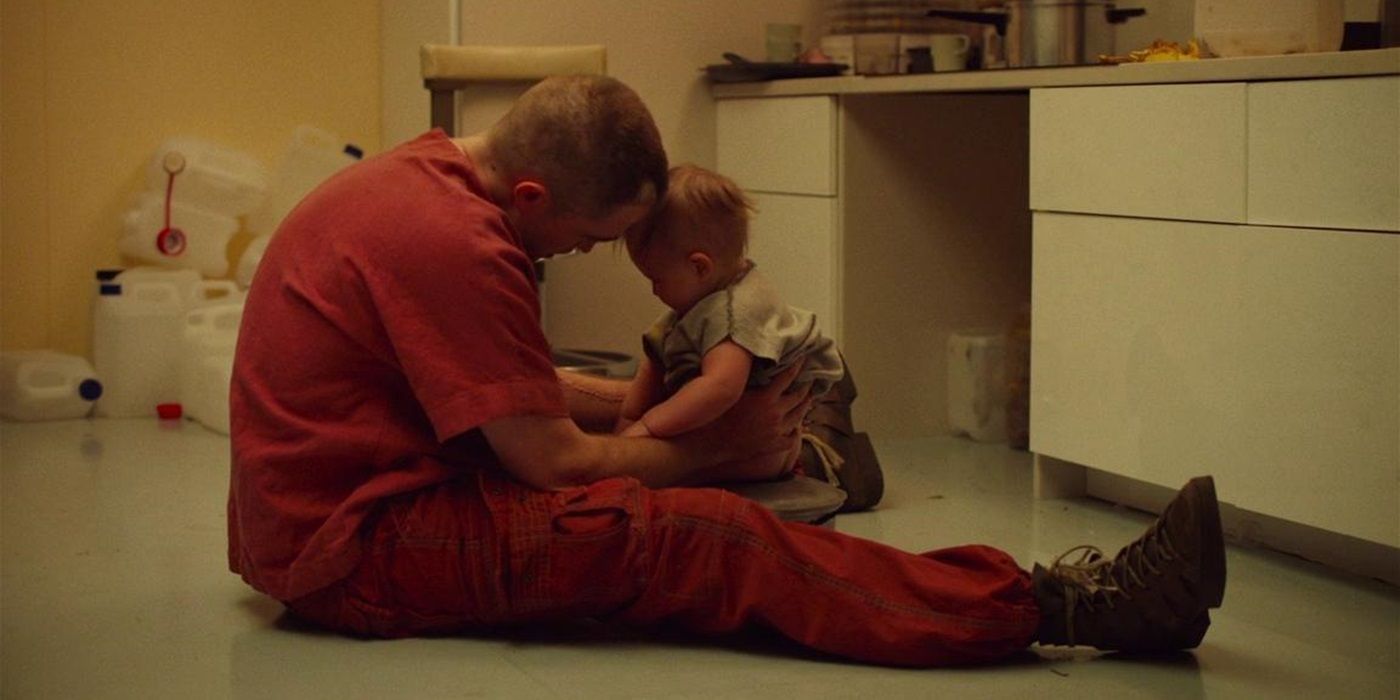The Huge Image
-
Excessive Life
follows a father and daughter struggling to outlive in isolation in house, uncovering darkish truths. - Autonomy, desperation, and humanity are themes well-explored on this airtight sci-fi movie.
-
Excessive Life
challenges conventional house film tropes with its intense and ambiguous ending.
Within the ultimate moments of Claire Denis’s introspective sci-fi drama High Life, Robert Pattinson’s criminal-turned-astronaut-turned-dad Monte and his teenage daughter, Willow (Jessie Ross), come throughout a spaceship equivalent to the one they’re in. The one distinction is the quantity on the ship’s carcass, which signifies that it left Earth after Monte’s mission. Adrift for a few years — a long time, even — Monte decides to board the ship within the hopes of discovering somebody to information them residence or every other type of help. From their very own ship, younger Willow watches by a display as her father climbs on deck to search out not a human crew, however a pack of semi-feral canines, a few of which appear to be lengthy useless. It’s a surprising, heartbreaking scene that echoes Monte’s personal backstory. It additionally matches like a glove on this dismaying story that asks arduous questions on what makes us human, and the way a lot of our humanity really stays within the face of progress and excessive adversity.
Initially launched in 2018, Excessive Life is Denis’ first English-speaking movie. Written by Denis and her long-time collaborator Jean-Pol Fargeau, the movie follows a father and daughter duo struggling to outlive in a derelict spaceship, recognized solely by the quantity 7. Or it tells the story of a bunch of prisoners became astronauts by an odd sentence commuting program. Each synopses are equally true, and the one you select relies upon completely on how a lot of the plot you’re prepared to share. Regardless of having a fairly simple plot, together with a scene by which a professor (Victor Banerjee) explains what’s going on to an viewers surrogate, Excessive Life can be a airtight movie at occasions. Some viewers had been notably puzzled by the ending, from the canines sequence to the final scene of Monte and Willow speaking to one another after flying right into a black gap.
What Is ‘Excessive Life’ About?
Excessive Life begins with Monte working across the spaceship, performing numerous upkeep duties by himself whereas making an attempt to deal with Willow (performed as a child by Scarlett Lindsey). From his voice-over in addition to items of his one-way conversations with the kid, we start to grasp the precariousness of their state of affairs. Regardless of nonetheless receiving televised photos from Earth, they’ve misplaced all contact with their residence planet. Some visible clues additionally assist us paint a much bigger image: the our bodies saved in cryogenic state point out that Monte and Willow had been half of a bigger crew; the disposal of the our bodies into outer house inform us that the ship’s programs are failing and might’t maintain life for lengthy. Monte’s determination to decorate them up in spacesuits earlier than throwing them out exhibits that he cares for them and hopes in opposition to all hope that they might nonetheless survive. These scenes are intertwined with photographs of two youngsters and a canine enjoying in an earthly forest. They appear to be recollections of Monte’s earlier life, however it’s arduous to inform for positive.
Till, in fact, the aforementioned professor reveals to us the character of Monte’s mission, and the movie cuts to the previous, to a time earlier than Willow was born. One of many children enjoying within the flashbacks was certainly Monte, who killed his good friend with a rock after contemplating her answerable for the dying of his canine. He’s been imprisoned since childhood and, alongside different convicted criminals, has agreed to take part in an expedition to try to harvest power from a close-by black gap. It’s a suicide mission, however they don’t know that. Likewise, they’re unaware that energy harvesting isn’t the analysis’s primary concern, even when it is likely to be an advantageous final result. The true aim, the movie tells us verbally, is to evaluate how nice ranges of radiation influence the human physique. Nonetheless, the truth that the ship was meant to lose connection to floor management from the get-go means that the mission’s objective is solely to rid Earth of undesirables.
Nonetheless, Monte, Tcherny (André 3000), Boyse (Mia Goth), and the opposite crew members observe their directives often. Most of them additionally adjust to the analysis carried out by the de facto captain of the ship, a health care provider named Dibs (Juliette Binoche). Convicted for the homicide of her husband and their two youngsters, Dibs inseminates the ladies of the ship with the boys’s semen in an effort to produce a child that can have the ability to endure the black gap’s excessive radiation ranges. Solely two individuals refuse to take part in her mission: Boyse, who douches to get rid of the sperm injected by Dibs, and Monte, who adopts a monastic way of life.
Regardless of being an especially sexually charged film, Excessive Life has no intercourse scenes. It’s implied that the ship’s crew is forbidden from having intercourse with one another, even for procreation. The one intimate contact they’ve with each other is thru violence. To satiate their sexual want, they’ve entry to an intricate masturbation gadget dubbed “the f–kbox.” On this state of affairs, Dibs makes use of intercourse as a method of exerting energy over them, primarily by breeding them like livestock as a substitute of permitting them to breed naturally. Nonetheless, Denis additionally exhibits her as a “tease,” seducing members of the crew and subsequently denying them intercourse. Utilizing the medicine to which she has entry to, Dibs additionally rapes Monte whereas he’s asleep to gather his sperm and injects it into an unconscious Boyse. From this non-consensual union, Willow is born.
The delivery of Willow is each preceded and adopted by the “dying” of a lot of the ship’s crew. The citation marks, right here, are used as a result of, as a result of cryogenic course of, it’s unclear whether or not those who died aboard the ship really handed or had been merely put in stasis till they may very well be healed of their accidents or illnesses. Nonetheless, two extraordinarily vital deaths do happen earlier than Monte is left alone with Willow. The primary one to go is Boyse, who hijacks one of many ship’s pods and flies it into the black gap, dying of a head explosion. The second is Dibs, who locks herself out of the ship after being severely injured.
‘Excessive Life’ Places the Highlight on Autonomy and Desperation
Having the ability to make selections, to have management over our our bodies and what’s accomplished to them, is a necessary a part of being human. Each time our autonomy is put into query, whether or not by imprisonment or the restriction of reproductive rights, it’s as if our personal standing as people is put into query. Thus, each Monte’s monastic abstinence and Boyse’s obsessive douching are methods of exhibiting company and management over themselves. Likewise, the 2 suicides are determined makes an attempt at exerting autonomy in a state of affairs by which you don’t have any say over every other facet of your life. This is likely one of the the reason why the invention of the canine ship is so impactful to Monte. Upon coming aboard, he realizes that they’d as a lot selection in accepting that mission as these canines: just like the animals, they didn’t know what they had been doing and had been left to fend for themselves. Moreover, the quantity 9 on the canine ship’s carcass signifies that it left Earth after Monte’s crew; that’s, after Victor Banerjee’s professor made his speech concerning the inhumanity of sending prisoners to die in house. Very like Monte when he killed his childhood good friend, the researchers answerable for the mission put the lives of animals over human lives — specifically, the lives of incarcerated people.
Nonetheless, these usually are not the one points introduced forth by the invention of the canine ship. Whereas the inhabitants of ship quantity 7 dwindled, the pack of feral canines continued to breed. There are puppies amongst them, presumably feeding on the corpses of those who died. Not like people, canines don’t have any idea of cannibalism or incest. They don’t perceive the notion of taboo, which Monte tries to impart to his toddler daughter within the first couple of minutes of the film by the instance of consuming feces and consuming urine.
Monte is aware of that, in an effort to preserve life going within the spaceship — to make human life abound similar to the vegetation from the ever-growing backyard — he must violate considered one of humanity’s most important taboos. And, in contrast to his determination to affix the black gap mission, this can be a selection he must make knowingly. Earlier than disappearing into the darkness, Dibs informs Monte of Willow’s parentage, ensuring that he won’t ever have the ability to declare ignorance. That is why, when recording his journal entry after disposing of the cryogenically frozen our bodies, Monte states that he’s properly conscious of the implications. Additionally it is why the shot of Willow having her first interval is so vital, and why Monte is so hopeful after they discover ship quantity 9. He’s not solely in search of assist and provides, however for a group by which he and Willow can guarantee the continuation of human life with out committing incest. He’s in search of a option to stay human, adhering to the rituals and legal guidelines that information human society. As a substitute, all he finds is the reaffirmation that, a minimum of in that nook of house, he is similar as an animal.
Within the very ultimate scene of Excessive Life, Monte and Willow fly one other one of many ship’s pods into the black gap, dressed of their house fits. Then, the picture fades to black, and we see a quick trade of phrases between Monte and Willow by which he asks her if she is prepared, and she or he agrees. Credit roll as a song by Tindersticks that includes vocals by Robert Pattinson himself performs, with very suggestive lyrics: “Willow, are we speeding ahead, are we standing nonetheless? (…) Willow, do you are feeling the solar upon your again? A lover’s hand. Breath. An abyss.” It’s a doubtful ending that, very similar to the track that accompanies it, might be interpreted each actually and figuratively. A technique of seeing it’s that Monte and Willow adopted the identical path as Boyse, killing themselves to retain what makes them human — of their case, the taboo of incest as a substitute of autonomy. Nonetheless, it’s also doable to construe the flight into the black gap as an acceptance of their destiny, of the truth that, to maintain life going, they must give in. It’s a leap into the unthinkable, and there’s no understanding what lies on the opposite facet.
‘Excessive Life’ Is Extraordinarily Completely different from Different Area Motion pictures of Its Time
From 1988’s Chocolat to 1999’s Beau Travail, her higher recognized, French-spoken films, Denis isn’t precisely the type of director praised for making legit crowd pleasers. Her extraordinarily sensual, usually laconic and slow-paced movies are seen by many viewers members as boring and pointless. This, nevertheless, couldn’t be farther from the reality: Denis’ physique of labor is each tense and intense, and her films are stuffed with that means, although mentioned that means may not be that straightforward to understand. This makes her one of the critically acclaimed filmmakers of her technology. And this divide between basic audiences and critics is straightforward to see on websites corresponding to Rotten Tomatoes, by which Excessive Life boasts an 82% essential rating versus 42% from common viewers. It’s comprehensible. In spite of everything, Excessive Life is a far-cry from different, extra optimistic house films of the 2010s, from Interstellar to The Martian to, sure, even Gravity –a fact that has not gone unremarked upon by critics.
As a matter of truth, as identified by Matt Zoller Seitz of RogertEbert.com, the film has much more in frequent with sci-fi tasks of the Seventies, from the American-made 2001: A Area Odyssey to the Soviet basic Solaris. Denis is much less involved with the wonders of humanity making its mark on the celebs and extra with the horrors that we’d encounter. These horrors usually are not of the Lovecraftian kind, nor of the face-hugging selection. As a substitute, they’re the horrors inflicted on us by the influence that house could have on our psyche. For if we’re exterior the boundaries imposed on us by Earth and the cultures which have emerged upon it, who is aware of what we’d create on the market? Who is aware of what we’d discover, and even what lies on the opposite facet of a black gap?
There additionally appears to be a component of sophistication to Denis’ movie. Excessive Life doesn’t observe intrepid adventurers making their method throughout the universe, however convicts pressured to resist a actuality that none of them selected. Is it moral to submit these people, and even different creatures, to such horrible issues in an effort to additional our colonization of house? “An enormous leap for mankind,” that’s the phrase all of us bear in mind once we consider new advances in house expertise and house journey, however who’re these which can be left alongside the way in which? Who’re the victims of humanity’s so-called progress? That’s what Excessive Life appears to need us to think about because it portrays the distress of people handled as beasts.
‘Excessive Life’ Helped Robert Pattinson Redefine His Profession
However possibly this is not what the film is about in any respect. Or possibly it’s about this and likewise plenty of different little issues. In an interview with GQ, Denis’ acknowledged that she would not actually know what her film is about, very similar to many viewers members that stumbled upon it and determined that’s wasn’t for them. “Additionally, I do not perceive Cosmopolis. However I imply, I am not inquisitive about understanding, actually. It is not a joke, I needn’t perceive, I want to be ok with one thing, that is all I want.” Now, Excessive Life is not precisely a really feel good film, however it’s positively a mission that one ought to be ok with finishing. It’s a wondrous piece of artwork, one which forces us to interpret it, to debate its doable meanings, in order that we are able to discover that means inside ourselves. It has this a lot in frequent with David Cronenberg‘s Cosmopolis. Nicely, that and the truth that each films helped Robert Pattinson redefine his profession.
Granted, Cosmopolis did it first. Launched in between the 2 ultimate installments of the Twilight saga, by which Pattinson initially rose to stardom, the film served as the teenager icon’s declaration of intent in regard to the movie business. By starring in an formidable Cronenberg head-twister, Pattinson made it clear to his younger followers and to audiences usually that he was not a one-hit-wonder and that he had no intention of cashing his Twilight verify and locking himself up at residence. As a substitute, he wished to be taken severely and was not afraid of accepting roles in advanced films that weren’t essentially blockbusters. With Excessive Life and his following film, Robert Eggers‘ tense and claustrophobic The Lighthouse, Pattinson continued to pivot away from his Twilight years, creating an area for himself in arthouse cinema as a lot as in large tasks corresponding to The Batman.
Excessive Life is at the moment accessible to stream on Max within the U.S.






